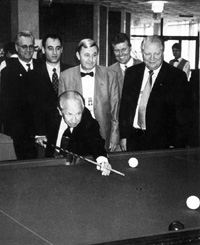Napoleon’s Favorite Game

The roots of the history of billiards extend back into the depths of centuries. While excavating on the territory of today’s Egypt, archeologists unearthed objects testifying that the ancient ancestors of that country played a game by means of sticks resembling those used in hockey and stone implements shaped like balls. A game resembling billiards also occurs in ancient Egyptian wall drawings. This game shifted to courtyards and then to indoor premises. It is quite possible that it signaled the emergence, development and establishment of billiards in the currently common sense of the word.
For many centuries billiards as a game was accessible primarily to the aristocratic upper classes. For the game required tables made of rare varieties of wood, richly carved cues, and (not only for luxury but also to improve the designed capacities) ivory balls. It took about 50 tusks to make three such balls! Little wonder that the emergence of the first billiard table is associated with French King Louis XI. It is noteworthy that this table had one pocket in the center. In the sixteenth century Mary Queen of Scots was executed in London. She was buried wrapped in a cloth usually used for covering billiard tables. This fact is quite eloquent in itself. Napoleon I was also a passionate billiard aficionado. Could this be caused by a certain likeness between battles on the billiard table and in the field? A wise strategy, well-calculated tactics, the ability to assess the situation and its consequences quickly and then strike a sure shot: this is billiards in the exalted sense of the word. And whoever thinks that billiards only boils down to stupid mechanical blows on the ball is gravely mistake. It is not accidental that this game is called green field chess.
There are three main varieties of billiards today: pool (one of 16 balls is in play), carom billiards (on a pocket-free table), and snooker (one of 22 balls is in play). Pool billiards, originating in the US, has been experiencing a virtual boom in Europe since the 1970s.
A few years ago, the curriculum of the Ukrainian National University of Physical Education and Sports was enriched with a new subject, billiard sports. To organize the teaching and in-service training process, the university rector, Professor Volodymyr Platonov, whose efforts were largely responsible for this innovation, invited Sweden’s Jorgen Sandman, one of the grandees in this sport and president of the World Pool Billiards Confederation, to work in Ukraine. To say that pool is Sandman’s whole life is to say nothing. Journalists often ask him what made him come to this country. But he, in cool Scandinavian blood, is only doing his favorite business and training young cadres in a sport new to us. Is this not an adequate answer?
Pool billiards was recently granted the status of an Olympic sport. And, who knows, the near-future Olympics may perhaps honor Ukrainian champions. And for the time being, we will see in 2000 the European junior championship, now being prepared under the close scrutiny of the World Pool Association.
Выпуск газеты №: Section






